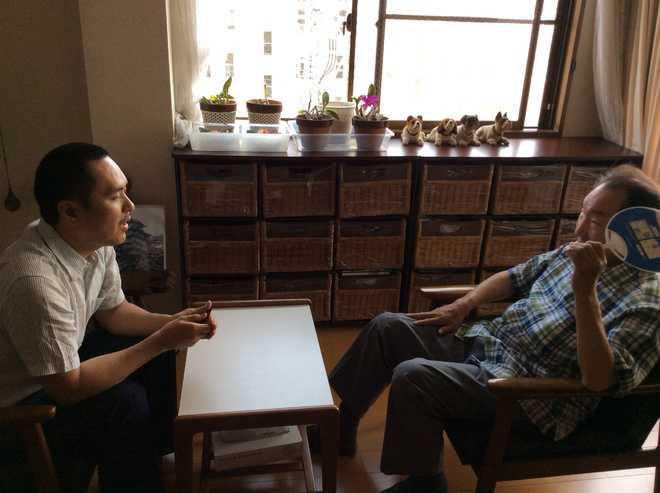
Japanese filmmaker Hiroshi Sunairi (left) during the making of 48 Years — Silent Dictator, which probes complex psychology.
Saibal Chatterjee
Hiroshima-born, New York-based film director-producer Hiroshi Sunairi’s world has no boundaries. Having made films in Tibet, India, Japan and Anahuac, the heartland of Mexico’s Aztec civilisation, his projects aim to expand the form and content of the medium. He is now researching for a hybrid documentary/ biography/ fiction film on the life and work of the Bengali modernist poet Jibanananda Das (1899-1954). “I am first an artist and then a filmmaker,” asserts 46-year-old Sunairi, explaining his eclectic choice of themes as a cinematic experimentalist.
The filmmaker attended the recent seventh Dharamsala International Film Festival for the screening of his latest work, 48 Years — Silent Dictator, a probe into the complex psychology of a former professional boxer suffering from prison psychosis as a result of being a death-row inmate for nearly half a century. The documentary, based on an interview with Iwao Hakamada, now 79, was made in 2015, a year after he was set free by a court because the mass murder charge against him was found to be fabricated. Sunairi’s Jibanananda Das project, titled Das, has its roots in his 2012 film Where It Flows Out into the Plains, “a meditative and spiritual travelogue” that was filmed in various parts of India. The filmmaker is due to shoot the new film in 2020. How and why did a litterateur who worked in a place and language so far removed from Sunairi’s catch his attention?
“It was during the filming of Where It Flows Out into the Plains that I was introduced to his work,” he says. “Das was a prolific poet, writer, novelist and essayist who published only sporadically in his lifetime.”
Active during the last phase of Rabindranath Tagore’s life and for over after the Nobel laureate’s death, the introverted, reclusive Das was described as “the most alone of poets”. The idioms and cadences that he employed made his work somewhat inaccessible. “Tagore is known the world over, Das isn’t,” says Sunairi. “I’m trying to understand his world through his short stories. I will move to his diaries next. (The film’s co-scriptwriter) Maitreyee (Bhattacharya Chowdhury) is currently reading the essays. I will read them once she is done,” he adds.
Sometime next year, Sunairi will spend several months in Kolkata talking to people who know Das’ life and work. “The final shape of the film will emerge only after that process,” he says. He says he now knows that Das is popular in both Bengal and Bangladesh. “I recently got talking to a New York cabbie, who was from Bangladesh. He, too, was aware of his poetry,” says the filmmaker, who has lived in Brooklyn for 27 years. Das will be a blend of an experimental documentary with an international feel and a Bengali cinema-style film essay. “I have watched the films of (Satyajit) Ray and (Ritwik) Ghatak,” he says. “I will weave the distinctive texture and feel of their cinema into my film.”
Sunairi is currently giving finishing touches to Mao Ishikawa: From Okinawa with Love, a film about a photographer who has done a book of images of Okinawan women with Black American GIs tracing the history of sexual crimes by the US army in Okinawa.
Sunairi is also the brain behind Tree Project, which archives documentations of a campaign to take the seeds of trees that survived the atom bomb attack on Hiroshima. At a post-screening discussion in Dharamsala, Sunairi revealed that invites people across the world to plant a seed of a Hibaku (atom-bombed) tree received from tree doctor Chikara Horiguchi and nurture them to maturity. The film on this unfolding exercise is a work in progress. Today, more than 100 second-generation Hibaku trees are growing in different parts of the world.
The process and the outcome are inextricably linked to each other in Sunairi’s work. A film of his is like a seed thrown into the wind — its trajectory and the spot where it lands determine its scope and substance.



























